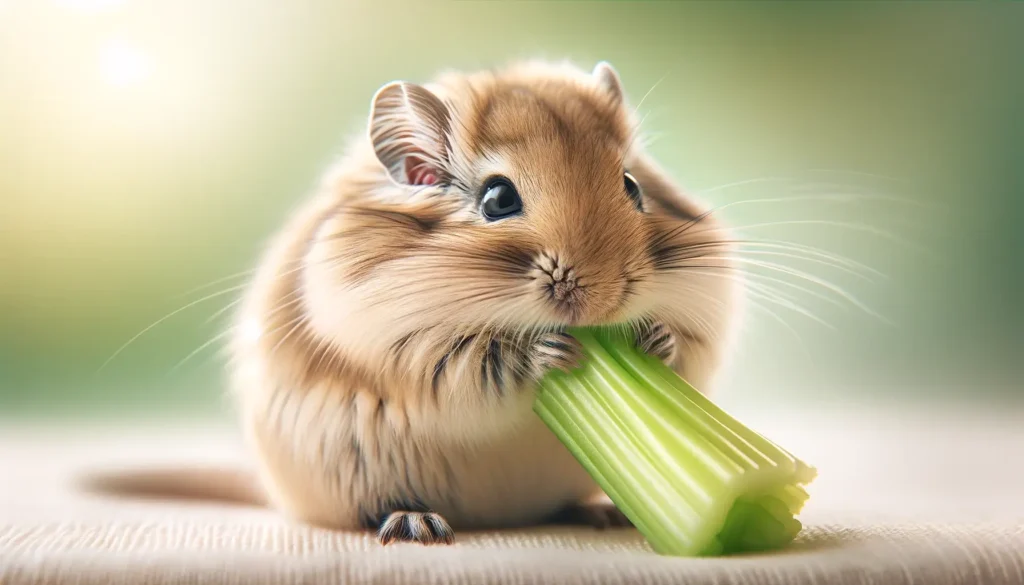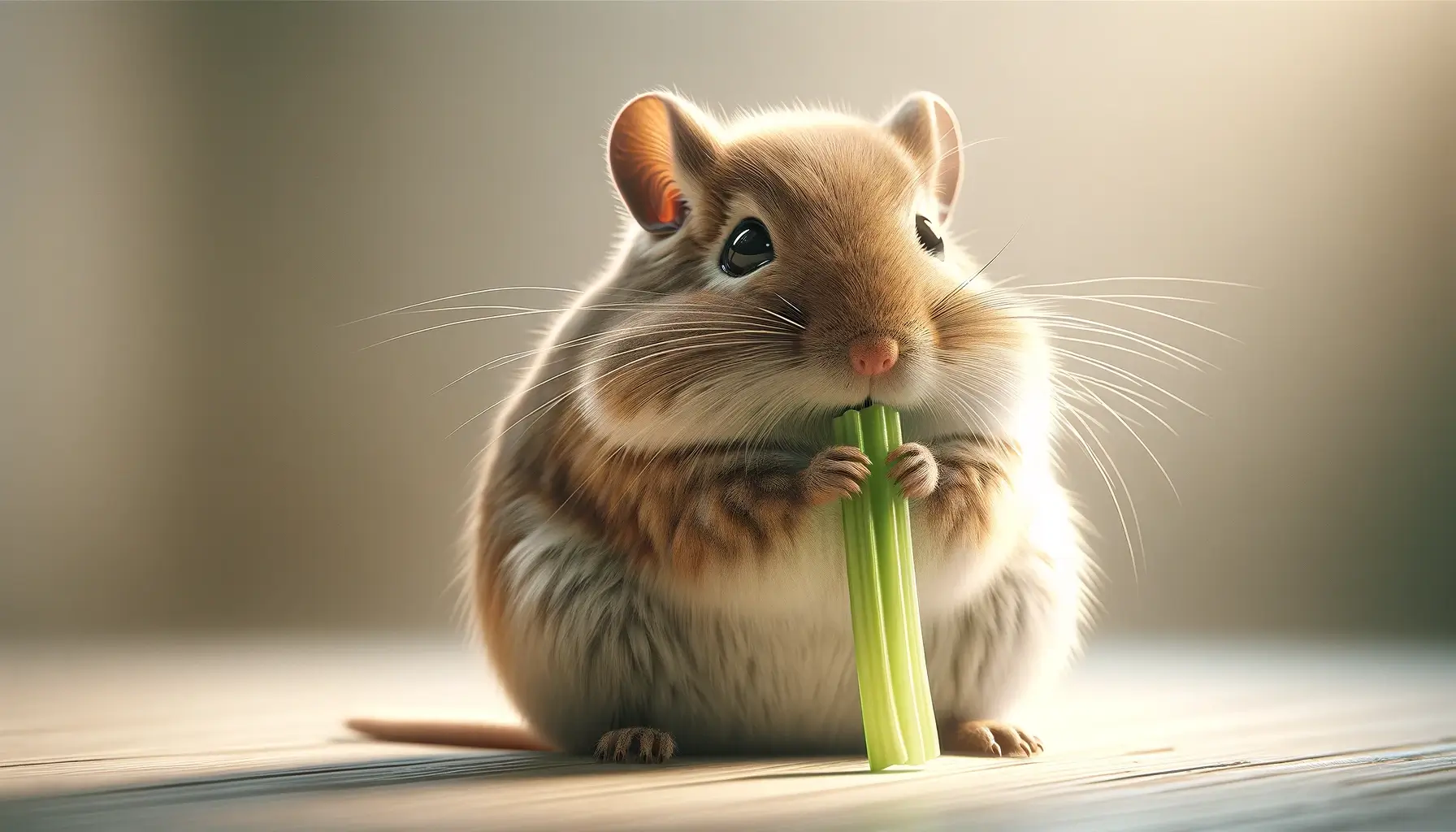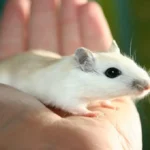Are you wondering if you can share that crunchy stick of celery with your furry little friend? You’re not alone. Many gerbil owners are curious about what foods are safe and nutritious for their pets.
In this blog, we’ll dive into whether celery is a suitable snack for your gerbil, how to introduce it safely, and the precautions you should take. Let’s ensure your gerbil enjoys a varied and healthy diet without any risks.
Can Gerbils Eat Celery?
Celery is a crunchy, nutritious vegetable that’s packed with vitamins and minerals, making it a healthy snack for humans. But can gerbils enjoy this vegetable too? The answer is yes, gerbils can eat celery, but it should be given in moderation.
Celery contains vitamins such as Vitamin B6, Vitamin C, Vitamin K, folate, and minerals like potassium, which can benefit gerbils. However, celery’s high water content poses a risk if consumed in large amounts. Gerbils have sensitive digestive systems, and too much water can lead to diarrhea, which can cause dehydration and other health issues.
Moreover, the fibrous nature of celery can be difficult for gerbils to digest if they’re not used to it. Therefore, while celery can be a part of your gerbil’s diet, it’s essential to introduce it slowly and in small quantities.
| Nutrient | Amount | Unit |
|---|---|---|
| Energy | 16 | kcal |
| Water | 95.4 | g |
| Protein | 0.7 | g |
| Total lipid (fat) | 0.2 | g |
| Carbohydrate, by difference | 2.97 | g |
| Fiber, total dietary | 1.6 | g |
| Sugars, total including NLEA | 1.34 | g |
| Calcium, Ca | 40 | mg |
| Iron, Fe | 0.2 | mg |
| Magnesium, Mg | 11 | mg |
| Phosphorus, P | 24 | mg |
| Potassium, K | 260 | mg |
| Sodium, Na | 80 | mg |
| Vitamin C, total ascorbic acid | 3.1 | mg |
| Vitamin A, IU | 449 | IU |
| Vitamin K (phylloquinone) | 29.3 | µg |
How to Safely Feed Celery to Gerbils?

Feeding celery to your gerbils safely requires a bit of preparation and knowledge about their dietary needs. Here’s how you can introduce celery into their diet without causing any health issues:
- Wash the Celery: Always wash the celery thoroughly to remove any pesticides or chemicals that could harm your gerbil.
- Cut into Small Pieces: Chop the celery into small, manageable pieces to prevent choking and make it easier for your gerbils to eat.
- Introduce Slowly: Start with a tiny piece of celery to see how your gerbil reacts. If there are no adverse effects, you can gradually offer more.
- Moderation is Key: Celery should only be a small part of your gerbil’s diet. A piece the size of their head once or twice a week is sufficient.
- Observe Your Gerbil: After feeding celery, watch your gerbil for any signs of digestive upset or discomfort. If you notice any negative reactions, it’s best to remove celery from their diet.
The Natural Diet of Gerbils
Understanding the natural diet of gerbils is essential for any pet owner looking to provide the best care for their furry friend. In their natural habitat, gerbils are not picky eaters. These resilient creatures have adapted to consume a variety of foods available in their environment, primarily in arid and semi-arid regions.
Their diet mainly consists of seeds, grains, insects, and plants. This variety ensures they get a balanced intake of nutrients, including proteins, fats, and carbohydrates, along with essential vitamins and minerals.
In captivity, it’s important to mimic this natural diet as closely as possible to maintain your gerbil’s health. A high-quality commercial gerbil mix, which usually contains a blend of seeds, grains, and pellets, serves as an excellent base.
However, supplementing this with small amounts of fresh vegetables and occasional fruits can enhance your gerbil’s diet, providing additional nutrients and variety.
Health Benefits and Dangers of Celery for Gerbils
Celery, with its high water content and rich nutritional profile, can be a beneficial snack for gerbils when offered in moderation. It’s a source of vitamin K, which is important for blood clotting, and other vitamins like vitamin C and vitamin B6, which support immune health and metabolism, respectively. Dietary fiber, which is also present in celery, can facilitate digestion.
However, the very high water content in celery that makes it a refreshing snack for humans can pose risks for gerbils. Their small bodies and delicate digestive systems can only handle so much water.
Overconsumption can lead to diarrhea, potentially causing dehydration and electrolyte imbalance. Moreover, the fibrous nature of celery can be challenging for gerbils to digest if they’re not accustomed to it.
To ensure the health benefits of celery are realized without the associated risks, it’s crucial to feed it to your gerbil in very small quantities and not as a regular part of their diet.
Observing your gerbil’s reaction to celery and adjusting their diet accordingly is key to safely incorporating this vegetable.
Alternatives to Celery for Gerbils
While celery can be a nice treat for gerbils, there are many other fruits and vegetables that can be safely added to their diet, offering a variety of flavors and nutrients. Here are some safe and healthy alternatives:
- Apples (without seeds): A sweet treat rich in fiber and vitamins, but should be given in moderation due to its sugar content.
- Carrots: Crunchy and full of beta-carotene, vitamins, and fiber, carrots are an excellent snack for gerbils.
- Broccoli: This vegetable is high in vitamins and antioxidants, offering a nutritious boost in small amounts.
- Cauliflower: Similar to broccoli, cauliflower provides vitamins and minerals and can be given as an occasional treat.
- Cucumber: With its high water content, cucumber is refreshing and hydrating, but like celery, it should be offered sparingly.
- Lettuce (in small amounts): Some types of lettuce can be a good source of hydration and nutrients, but avoid iceberg lettuce, which offers little nutritional value.
When introducing new foods to your gerbil’s diet, it’s important to do so gradually and in small quantities to avoid digestive upset. Always wash fruits and vegetables thoroughly to remove any pesticides or chemicals, and remove any uneaten fresh food before it spoils.
FAQs on Feeding Celery to Gerbils
Can gerbils eat celery leaves?
Yes, gerbils can eat celery leaves in addition to the stalks. In fact, the leaves are less fibrous and contain a concentration of nutrients, making them a potentially healthier option. However, as with celery stalks, leaves should be given in moderation to avoid digestive issues.
Can gerbils eat celery seeds?
Yes, gerbils can eat celery seeds in very small quantities. These seeds are high in nutrients but should be given sparingly due to their potent flavor and potential health risks if overconsumed. Always introduce any new food, including celery seeds, gradually to monitor for any adverse reactions.
Can gerbils eat raw celery?
Yes, gerbils can eat raw celery in very small amounts as an occasional treat. However, due to its high water content, it’s important to feed celery sparingly to avoid digestive issues. Always chop it into small, manageable pieces to prevent choking and monitor your gerbil for any adverse reactions.
How often can I feed my gerbil celery?
Celery should be considered a treat rather than a staple of your gerbil’s diet. It’s recommended to feed your gerbil a small piece of celery once or twice a week at most. This frequency ensures that your gerbil benefits from the nutrients in celery without the risk of overhydration or digestive upset.
What are the signs of celery causing digestive issues in gerbils?
After feeding your gerbil celery, monitor them for signs of digestive discomfort. Symptoms to watch for include diarrhea, lethargy, or a decrease in appetite. If you notice any of these signs, it’s best to remove celery from their diet and consult with a veterinarian if symptoms persist.
Conclusion
Incorporating celery into your gerbil’s diet can offer variety and additional nutrients, but it’s crucial to do so with care and moderation. Understanding the natural diet of gerbils, the health benefits and potential dangers of celery, and suitable alternatives ensures that you can provide a balanced and nutritious diet for your pet.
Always introduce new foods gradually and monitor your gerbil’s health to ensure they’re thriving under your care.











